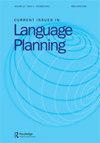语言政策的参与与审议:以中性语言为例
IF 1.8
1区 文学
Q2 EDUCATION & EDUCATIONAL RESEARCH
引用次数: 5
摘要
摘要本文通过参与和协商的方法,以及更具体地说,巴塞罗那市议会(西班牙)对中性语言的监管,调查了语言政策的形成。通过对政策的论证方法,本文考察了一种特定的语言政策理念、过程和解决方案,以及决策者使用的附带的话语论证。论文(a)表明,语言先入为主的观念和权力关系可能构成对语言进行有效审议的潜在障碍,(b)认为,如果地方治理模式(而不是分配给语言学院的集中角色)将被用来规定制度背景下的语言实践,应该做出安排,让人们能够接触到关于语言的各种观点,做出反思性的判断,并促进公开的争论交流。最后,本文讨论了这项研究对将深思熟虑纳入语言政策制定的影响。本文章由计算机程序翻译,如有差异,请以英文原文为准。
Participation and deliberation in language policy: the case of gender-neutral language
ABSTRACT This paper investigates language policy formation through participatory and deliberative methods and, more concretely, the regulation of gender-neutral language in Barcelona City Council (Spain). Through an argumentative approach to policy, the paper examines a specific language policy idea, process and solution, and the accompanying discursive argumentation used by decision-makers. The paper (a) shows that linguistic preconceptions and power relations may constitute a potential barrier to effective deliberation on language, and (b) argues that if local modes of governance (as opposed to the centralised role assigned to language academies) are going to be used to prescribe language practices in institutional contexts, arrangements should be put in place to provide access to a full range of views about language, generate reflective judgments and promote a public exchange of arguments. The paper concludes with a discussion about the implications of this study for the inclusion of deliberation in language policy-making.
求助全文
通过发布文献求助,成功后即可免费获取论文全文。
去求助
来源期刊

Current Issues in Language Planning
Multiple-
CiteScore
4.80
自引率
16.70%
发文量
26
期刊介绍:
The journal Current Issues in Language Planning provides major summative and thematic review studies spanning and focusing the disparate language policy and language planning literature related to: 1) polities and language planning and 2) issues in language planning. The journal publishes four issues per year, two on each subject area. The polity issues describe language policy and planning in various countries/regions/areas around the world, while the issues numbers are thematically based. The Current Issues in Language Planning does not normally accept individual studies falling outside this polity and thematic approach. Polity studies and thematic issues" papers in this journal may be self-nominated or invited contributions from acknowledged experts in the field.
 求助内容:
求助内容: 应助结果提醒方式:
应助结果提醒方式:


